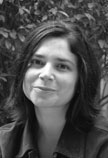 Joy Castro, Associate Professor of English and Department Chair at Wabash College, will present the 27th Annual LaFollette Lecture on Friday, October 20 at Wabash College.
Joy Castro, Associate Professor of English and Department Chair at Wabash College, will present the 27th Annual LaFollette Lecture on Friday, October 20 at Wabash College.
"Notes against Serotiny: Life-Writing and the Triple Bottom Line" will be the title of the presentation, which will begin at 4:15 p.m. in Salter Hall of the Fine Arts Center. A reception will follow her talk in the Littell Lobby in the Fine Arts Center.
Castro studied literature at Trinity University and Texas A&M University. She began publishing short stories during graduate school and took a position in 1997 teaching literature and creative writing at Wabash College.
An award-winning teacher, she publishes articles on innovative strategies for the post-secondary classroom, and her published literary scholarship focuses on experimental women writers of the 20th century such as Jean Rhys, Meridel Le Sueur, Sandra Cisneros, and Naomi Shihab Nye.
Committed to broadening the reach of higher education to communities in need, she has offered free courses to at-risk teenagers, low-income adults, and victims of domestic violence, and she runs the biannual Creative Writing/ Creative Teaching Conference for Indiana high school and middle school teachers.
Her honors include the Charles Gordone Award for Poetry and a Frank B. Vogel Scholarship in nonfiction at the Bread Loaf Writers' Conference, and her short fiction and creative nonfiction appear in anthologies and in journals such as North American Review, Cream City Review, Chelsea, Quarterly West, and Puerto del Sol.
She is the author of The Truth Book: Escaping a Childhood of Abuse Among Jehovah’s Witnesses.
The LaFollette Lecture Series was established by the Wabash College Board of Trustees to honor Charles D. LaFollette, their longtime colleague on the Board. The lecture is given each year by a Wabash College faculty member who is charged to address the relation of his or her special discipline to the humanities broadly conceived.
The LaFollette Lecture is free and open to the public.
For more information see: